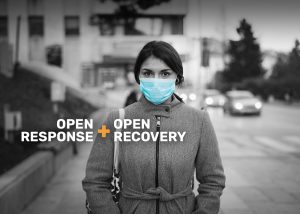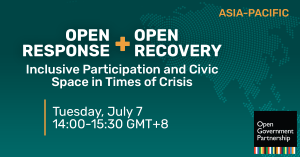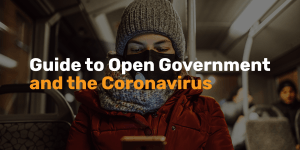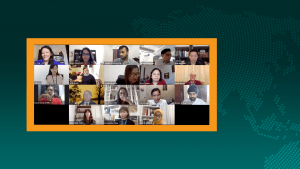Open Response + Open Recovery: Conversations with Asia-Pacific’s Open Gov Community
Respuesta abierta + Recuperación abierta: Conversaciones con la comunidad de gobierno abierto de la región Asia-Pacífico
On July 7, over 100 open government reformers across the Asia-Pacific region convened for the conversation “Open Response + Open Recovery: Inclusive Participation and Civic Space in Times of Crisis”. The discussion focused on how reformers in the region are working to maintain inclusive civic participation and protect and expand civic space during the COVID-19 pandemic. This is what we heard.
Across the Asia-Pacific region and the world, emergency measures to protect public safety and health during the pandemic have significantly affected progress on open government. Restrictions on civic space are disrupting civil society organizations’ ability to organize, assemble, and protest and harming the ability of activists and journalists to hold governments accountable.
During the regional conversation, government and civil society reformers shared challenges the pandemic has created for their open government work and opportunities to leverage the OGP platform to ensure transparencyAccording to OGP’s Articles of Governance, transparency occurs when “government-held information (including on activities and decisions) is open, comprehensive, timely, freely available to the pub... More, accountability, inclusionOGP participating governments are working to create governments that truly serve all people. Commitments in this area may address persons with disabilities, women and girls, lesbian, gay, bisexual, tr... More and participation in the response and recovery from the pandemic.
Watch the recording here:
Tackling Open Government Challenges
Civil society organizations across the region are struggling to operate in deteriorating environments, with a diminished capacity to fulfill their role of influencing social change and holding governments accountable, at a time when these functions are most needed.
In countries like Afghanistan, Mongolia, the Kyrgyz Republic and the Philippines, governments are enacting legislationCreating and passing legislation is one of the most effective ways of ensuring open government reforms have long-lasting effects on government practices. Technical specifications: Act of creating or r... that effectively restricts the registration and activity of non-governmental organizations, often under the premise of promoting open dataBy opening up data and making it sharable and reusable, governments can enable informed debate, better decision making, and the development of innovative new services. Technical specifications: Polici... and transparency, fighting fake news and misinformation, or countering money laundering and terrorism financing.
Independent media, a key pillar of civil society, is under duress in many places, with substantial shortfalls and restrictions on normal funding streams, censorship, and obscure use of legislation to criminalize or delist mediapersons and media outlets. A culture of fear is also leading to self-censorship in many places, further diminishing the important role of the media.
Even in the small handful of countries in the region where there are few direct threats to civic space, inadequate resourcing of the sector is making it increasingly difficult for civil society to mobilise and organize effectively. In a number of countries, politicisation of charitable taxPlacing transparency, accountability, and participation at the center of tax policy can ensure that burdens are distributed equitably across society. Technical specifications: Commitments related to c... concessions is jeopardising funding and limiting the capacity of civil society organisations that participate in advocacy. Throughout the region, as civil society groups increasingly fill gaps in public service provision or complement government efforts, many are finding it challenging to maintain their advocacy and watchdog role without these activities being adequately resourced.
As research from groups like Access Now shows, digital inclusionPrioritizing digital inclusion — such as by expanding broadband access to remote areas or removing barriers to affordable internet — helps ensure all citizens have the opportunity to participate. ... More and security have become mainstream issues during the pandemic – from questions around who has access to the internet, to digital security threats, and illegal surveillance and attacks against activists. And it’s increasingly clear that issues across society are impacted by issues of digital access and rights, and security– from governance to human rightsAn essential part of open government includes protecting the sacred freedoms and rights of all citizens, including the most vulnerable groups, and holding those who violate human rights accountable. T... to participation. Rise in digital authoritarianism and use of laws on cyber crime, cyber security and fake news and disinformation laws, being used for purposes beyond their stated purposes, to chill critics of governments in many places, including Bangladesh, Thailand, and the Philippines, amongst others. These challenges are exacerbated during the pandemic when remedy mechanisms like courts are harder to access for most people, as are legislative processes to influence changes in laws.
Claiming Space and Collaborating with Government
As the OGP community works through closing civic space challenges in the region, it’s clear that protecting civic space is a common responsibility of both government and civil society. Throughout the region, reformers noted that many governments run the risk of using civic engagement as a box-ticking exercise, where civil society and citizens are invited to submit proposals and ideas but then have little influence, or even visibility, of how ideas are further developed. OGP countries in particular need to do better, and uphold the principles enshrined in the Open Government Declaration they all signed up to.
As South Korea prepares for their OGP Steering CommitteeThe Steering Committee is OGP’s executive decision-making body. Its role is to develop, promote and safeguard OGP’s values, principles and interests; establish OGP’s core ideas, policies, and ru... co-chair year, the government amplifying its support to local, national, regional and global efforts to protect and expand civic space comes as a welcome move. As the Government of Korea noted, their experience shows that civic space does not have to be at risk during the pandemic. In South Korea, the response had been stronger because they partnered with civil society and citizens. Their much lauded Mask App, which showed mask availability in neighborhood pharmacies in early days of the pandemic, was the result of collaboration between government, public health professionals and citizen groups.
Even in difficult contexts, we’re seeing examples of civil society finding allies in government and forging strong collaboration to preserve and expand space and participation opportunities. For example, in Afghanistan civil society groups are working with the Ministry of Health on social audits of health centres and sharing information to improve coordination on the pandemic response. In Indonesia, the government and civil society have worked together in adapting Lapor!, their public complaints handling mechanisms for receiving public complaints and feedback related to the pandemic response. In Wellington, New Zealand, the government has run a trust model to identify partners in the community and support public debate on the pandemic response, using open data and shared data infrastructure in doing so. The government of South Cotabato, in the Philippines, has opened up their internal audit process to external evaluators, including civil society groups. They have also agreed on clear sunset clauses and retention policies on data gathered by the government for contact tracing to ensure privacy. The International Center for Not-for-Profit Law (ICNL) has compiled even more examples of positive civic space actions around the world in this briefing.
The value of diverse civil society groups coming together and forming stronger coalitions has also been evident. In the Philippines, media organizations like the Philippine Center for Investigative Journalism are leading efforts to share stories of the impact of the pandemic on the most vulnerable in society to bring attention to where there are gaps for policymakers to address. In many countries, open data and freedom of information requests are being used to seek and share information on the government’s response to the pandemic. Civil society groups in Mongolia and Kyrgyzstan have rallied together to get temporary stays, delays, or amendments on restrictive NGO laws. Digital security resources and training opportunities provided by groups like Access Now, Hivos and others are helping civil society groups get better at ensuring their safety and security.
These examples give reason for some hope. But they are not close to being enough to address the magnitude of the challenges we’re seeing in the region. As many OGP countries in the region commence the process of developing new OGP Action Plans, there is an opportunity to ensure these plans address these challenges head on. Healthy civic space is afterall a precondition for any open government reform to succeed in the long run.
Using the OGP Platform
As countries in the region struggle to address the civic space, public health and economic challenges of the pandemic, there’s an opportunity to leverage open government principles and build back better. Most obviously, OGP action plans and the national dialogue processes are a prime opportunity to address these issues. Additionally:
- In the short term, OGP multi-stakeholder forums can be used to discuss and agree upon open response measures. In the longer-term, the co-creation processCollaboration between government, civil society and other stakeholders (e.g., citizens, academics, private sector) is at the heart of the OGP process. Participating governments must ensure that a dive... used to develop action plans can be used to safeguard civil society’s equal seat at the table.
- Countries can make open government commitments to protect the public’s ability to associate and assemble, express itself, and participate in decision-making.
- The OGP platform can also be used to continue to cast a spotlight on challenges, share successful strategies and tactics and access support from the wide community of partners and practitioners.
El 7 de julio, más de 100 reformadores de gobierno abierto de la región Asia-Pacífico se reunieron en el foro “Respuesta abierta + Recuperación abierta: Participación inclusiva y espacio cívico en tiempos de crisis”. La discusión se enfocó en el trabajo que los reformadores han impulsado para mantener la participación cívica y proteger el espacio cívico durante la pandemia de COVID-19. A continuación presentamos lo que escuchamos.
En la región de Asia-Pacífico y en todo el mundo, las medidas de emergencia desplegadas para proteger la salud pública y la seguridad durante la pandemia han afectado los avances al gobierno abierto. Las restricciones al espacio cívico están afectando la capacidad de la sociedad civil de organizarse, reunirse y protestar, lo cual ha limitado la capacidad de los activistas y periodistas de exigir a los gobiernos que rindan cuentas.
Durante la conversación, los reformadores de gobierno y la sociedad civil compartieron los retos que la pandemia ha ocasionado para su trabajo de gobierno abierto, así como las oportunidades que existen para aprovechar la plataforma de OGP para asegurar la transparencia, rendición de cuentas, inclusión y participación durante la respuesta y recuperación a la pandemia.
Mira la grabación aquí:
Enfrentando retos de gobierno abierto
Las organizaciones de la sociedad civil de toda la región están operando en ambientes deteriorados, con una menor capacidad de desempeñar su papel de impulsar cambios en la sociedad y exigir a los gobiernos que rindan cuentas, en un momento en que estas funciones son más necesarias que nunca.
En países como Afganistán, Mongolia, Kirguistán y Filipinas los gobiernos han publicado leyes que restringen el registro y actividad de las organizaciones no gubernamentales bajo la premisa de promover los datos abiertos y la transparencia, luchar contra las noticias falsas, la desinformación, el lavado de dinero o el financiamiento al terrorismo.
Los medios independientes, pilar fundamental de la sociedad civil, se encuentran bajo presión en muchos sitios como resultado de las restricciones a los flujos de fondos, la censura y el mal uso de la legislación para criminalizar o limitar a los medios. Además, la cultura del miedo está llevando a la autocensura en muchos sitios, debilitando aún más el papel de los medios.
Incluso en los pocos países de la región en los que se han registrado pocas amenazas directas al espacio cívico, el sector está recibiendo pocos recursos, por lo que cada vez es más difícil para la sociedad civil movilizarse y organizarse efectivamente. En varios países, la politización de las beneficencias exentas de impuestos está amenazando los fondos y limitando la capacidad de las organizaciones de la sociedad civil de participar en actividades políticos. En toda la región, los grupos de la sociedad civil han cerrado la brecha de la provisión de servicios públicos o complementar los esfuerzos del gobierno; en ese proceso, muchos grupos están teniendo dificultad para sostener su papel de supervisión, debido a la falta de recursos.
Algunos grupos de investigación, como lo demuestra Access Now, la inclusión digital y la seguridad han sido los problemas serios durante la pandemia – desde preguntas sobre quién tiene acceso a internet hasta amenazas a la seguridad digital y vigilancia ilegal a los activistas. Es cada vez más claro que los problemas de la sociedad están siendo afectados por problemas de acceso digital y derechos y la seguridad: gobernanza, derechos humanos y participación. El alza en el autoritarismo digital y el uso de las leyes en los crímenes cibernéticos, la ciberseguridad y las leyes sobre información falsa y desinformación utilizados para fines más allá de los establecidos, para detener a los críticos del gobierno en muchos sitios, entre otros, en Bangladesh, Tailandia y Filipinas. Estos retos se han exacerbado durante la pandemia, pues los mecanismos de remediación son más difíciles de acceder para la mayoría de las personas, así como lo son los procesos legislativos para promover cambios en las leyes.
Reclamando el espacio y encontrando aliados
La comunidad de OGP está trabajando en un contexto de límites al espacio cívico en la región; en ese sentido, es claro que proteger el espacio cívico es una responsabilidad común al gobierno y la sociedad civil. En toda la región, los reformadores mencionaron que muchos gobiernos corren el riesgo de utilizar la colaboración con la sociedad civil solamente como el cumplimiento de un requisito, invitando a la sociedad civil y a la ciudadanía a enviar propuestas e ideas, cuando en realidad tienen poca influencia y visibilidad de cómo se desarrollan las ideas. Los miembros de OGP en particular tienen que hacer un mejor esfuerzo y defender los principios de la Declaración de Gobierno Abierto con los que se comprometieron.
Corea del Sur se está preparando para su primer año como copresidente del Comité Directivo; en ese sentido, el gobierno está amplificando su apoyo a los esfuerzos locales, nacionales, regionales y locales para proteger y ampliar el espacio cívico son una medida muy pertinente. Como lo comentó el Gobierno de Corea, su experiencia demuestra que el espacio cívico no debe ponerse en riesgo durante la pandemia. En Corea del sur, la respuesta ha sido más fuerte debido a que se han asociado con la sociedad civil y con la ciudadanía. Su tan aclamada aplicación Mask, la cual ayudó a identificar la disponibilidad de mascarillas en las farmacias de las colonias durante los primeros días de la pandemia, fue el resultado de la colaboración entre el gobierno, los profesionales de la salud y la ciudadanía.
Incluso en contextos difíciles, estamos viendo casos en los que la sociedad civil se ha aliado con el gobierno y forjado colaboraciones sólidas para preservar y ampliar el espacio cívico y las oportunidades de participación. Por ejemplo, en Afganistán, los grupos de la sociedad civil están trabajando con el Ministerio de Salud en auditorías sociales de los centros de salud y compartiendo información para mejorar la coordinación asociada a la respuesta a la pandemia. En Indonesia, el gobierno y la sociedad civil han trabajado juntos en adaptar Lapor!, sistema de manejo de quejas públicas y retroalimentación relacionada a la respuesta a la pandemia. En Wellington, Nueva Zelanda, el Gobierno corrió un modelo de confianza para identificar socios en la comunidad y apoyo al debate público a la respuesta a la pandemia, utilizando datos abiertos y la infraestructura de datos. El Gobierno de Cotabato del Sur, en Filipinas, ha abierto sus procesos internos de auditoría a evaluadores externos, incluyendo grupos de la sociedad civil. Además, acordaron establecer cláusulas claras de fin de las medidas y políticas de retención de los datos recolectados por el gobierno para asegurar la privacidad. El Centro Internacional para la Ley sin Fines de Lucro ha compilado aún más ejemplos de acciones positivas sobre el espacio cívico de todo el mundo en este informe.
Además, ha sido evidente el valor de la diversidad de los grupos de la sociedad civil que se han reunido y formado coaliciones. En Filipinas, las organizaciones de medios como el Centro Filipino de Periodismo de Investigación están liderando esfuerzos para compartir historias sobre el impacto de la pandemia en los grupos más vulnerables de la sociedad para llamar la atención sobre los vacíos que los tomadores de decisiones deben abordar. En muchos países, los datos abiertos y las solicitudes de libertad de información se han utilizado para solicitar y compartir información sobre la respuesta que el gobierno ha tomado frente a la pandemia. En Mongolia y Kirguistán, la sociedad civil ha colaborado para establecer retrasos y enmiendas a las leyes que restringen a las ONG. Grupos como Access Now, Hivos y otros han ofrecido recursos de seguridad digital y oportunidades de capacitación para ayudar a los grupos de la sociedad civil a mejorar sus capacidades para asegurar su seguridad.
Estos ejemplos dan esperanza. Pero no son suficientes para atender la magnitud de los retos que se han registrado en la región. Muchos países de OGP de la reunión han iniciado el proceso de desarrollo de sus planes de acción, por lo que existe la oportunidad de asegurar que dichos planes atiendan estos retos. Al fin y al cabo, la sociedad civil robusta es un requisito necesario para asegurar que las reformas de gobierno abierto sean exitosas en el largo plazo.
Utilizando la plataforma de OGP
En los esfuerzos de los países de la región por atender los problemas al espacio cívico, la salud pública y la economía asociados a la pandemia, existe la oportunidad de aprovechar los principios del gobierno abierto y reconstruir de mejor manera. En primera instancia, los planes de acción y los procesos nacionales de diálogo son una oportunidad fundamental para atender estos problemas. Además:
- En el corto plazo, los foros multisectoriales de OGP pueden utilizarse para discutir y acordar medidas de respuesta abierta. En el largo plazo, el proceso de creación utilizado para desarrollar los planes de acción pueden utilizarse para salvaguardar la participación de la sociedad civil.
- Los países pueden establecer compromisos de gobierno abierto para proteger la capacidad del público de asociarse y reunirse, expresarse y participar en la toma de decisiones.
- La plataforma de OGP también puede utilizarse para seguir llamando la atención sobre los retos, compartir estrategias exitosas y tener acceso a apoyo de la comunidad.
No comments yet
Related Content

Open Response + Open Recovery
Our community’s fundamental values of accountability, transparency, inclusivity, and responsiveness are vital as we move through COVID-19 response to recovery. Find resources, events and examples from OGP and partners.

Open Response + Open Recovery: Inclusive Participation and Civic Space in Times of Crisis
Open government reformers from the Asia-Pacific region discuss how to maintain inclusive civic participation and hold and expand civic space during the COVID-19 crisis. Watch the recording...

A Guide to Open Government and the Coronavirus
This guide is a one-stop shop for the best current resources on how open government projects and approaches can support tackling the pandemic.


Leave a Reply